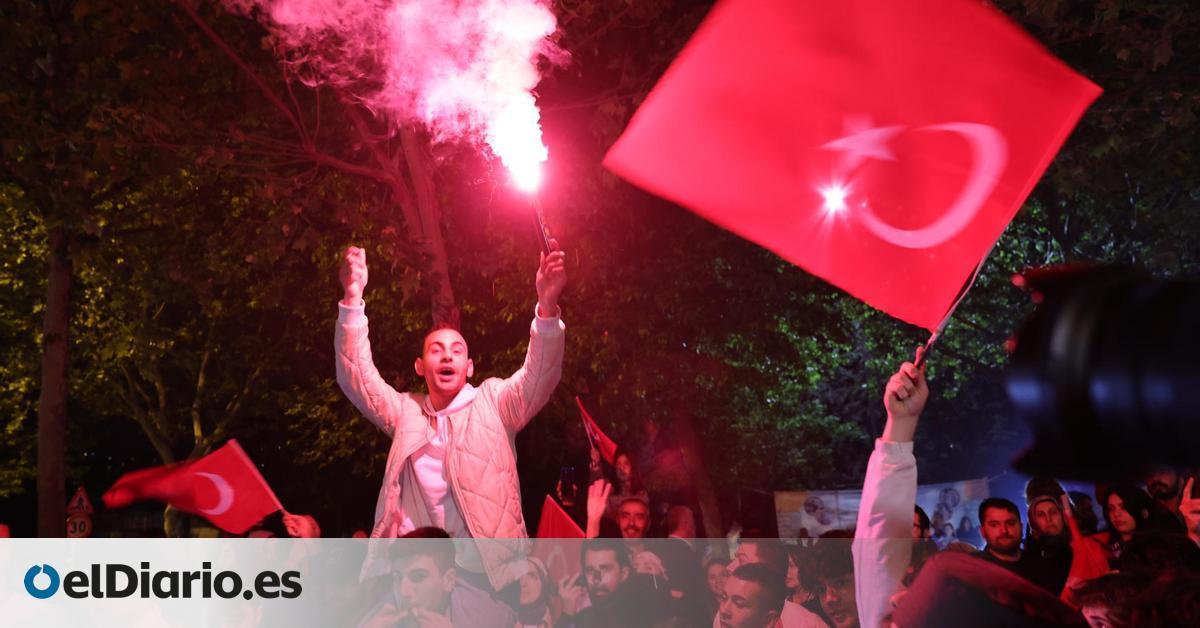
Turkey has held this Sunday the most important elections in the country in recent years. With more than 64 million registered voters, the president, Recep Tayyip Erdogan, is risking the presidency after 20 years in power. The first unofficial results published by the state agency Anadolu, with more than 95% counted, place the president with 49% of the vote and the main opposition candidate, Kemal Kılıçdaroğlu, with 44.5%. If none of the candidates reaches 50%, a second round will be held on May 28 between the two most voted.
In the past, the state agency has been accused of favoring Erdogan in publishing the results, but the independent Anka agency, which is used by more opposition outlets, has published a similar tally. Both agencies put turnout at around 88%, similar to the 2018 elections.
Despite the results announced by the agencies, the opposition coalition has indicated that, according to its calculations, Kılıçdaroğlu va en cabeza. The mayor of Istanbul, Ekrem Imamoglu, of the CHP and possible vice president, has accused Anadolu of manipulation and has denounced that the AKP is presenting complaints in the constituencies in which the opposition is ahead to delay the results, something in which it has Kılıçdaroğlu himself later insisted in a very brief televised intervention in which he did not speak of results.
However, Mansur Yavaş, the mayor of Ankara and another future vice president if the opposition wins, has acknowledged that a runoff is very likely. If this happens, the third candidate for the presidency, the nationalist Sinan Ogan, to whom both agencies give around 5%, will be able to play a fundamental role in that second vote by deciding the vote of his followers for Erdogan or Kılıçdaroğlu.
“There are millions of votes that are not reflected in the final results, mainly from regions led by the opposition. The electoral board has announced that only 71% of the votes have been counted. It is important to wait for the final results before drawing conclusions. Even so, a second round is most likely,” said Ilke Toygur, a professor at the Carlos III University of Madrid and a senior researcher at the think tank CSIS Europe Program.
In these historic elections, a coalition of six opposition parties from very different political traditions have come together to present a single candidate, Kemal Kılıçdaroğlu. In addition, although the pro-Kurdish formation Peoples’ Democratic Party (HDP) – the third largest force in Parliament – has not joined the opposition coalition, it has not presented a candidate for the presidency and has asked for a vote for Kılıçdaroğlu, who has been leading for 13 years the CHP (Republican People’s Party), the main opposition party and the formation created by the founder of the homeland, Mustafa Kemal Atatürk. Most of the pre-election polls gave Kılıçdaroğlu the victory.
Selahattin Demirtas, ex-president of the HDP, has also denounced the agency’s count state. “Don’t believe the Anadolu data, remember the 2019 elections,” said the politician, imprisoned since 2016.
In addition to the CHP, the opposition coalition includes the Good Party (Iyi Parti), born as a moderate split from the ultranationalist MHP formation; and other minor parties. Among them the Islamist-leaning Happiness Party and two others founded by former ministers who have fallen from Erdogan in recent years, including Ahmet Davutoglu, who was foreign minister and prime minister of the current president.
“Fiction, which started with 60%, has now fallen below 50%. Observers and members of the polling station must not leave their posts. We will not sleep tonight”, said Kılıçdaroğlu. Erdogan, for his part, has denounced that the opposition’s attempts “to hastily announce results are a usurpation of the national will.”
Meral Aksener, leader of the Good Party, the second force in the opposition coalition, has also questioned the announced results: “We have seen this film many times. We will pursue every vote our nation has cast to the very end. We’re here until morning, don’t worry, we’re winning!”
parliamentary elections
In parallel, the country has held parliamentary elections. The Grand National Assembly is made up of 600 deputies and Erdogan’s AKP currently controls 286, but his alliance with the ultranationalist MHP formation allows him to advance his legislative agenda. Until 2015, it had governed without interruption with an absolute majority, but in recent years it has experienced a clear loss of support. The Economist qualifies the appointment as the most important elections of 2023 in the entire world.
With more than 95% counted, both agencies give the AKP around 36% of the vote (268-270 seats) and its ally, the ultranationalist MHP, 10% (50-51). Together they would exceed the 300 that mark the absolute majority. The CHP obtains 26%, the Good Party 10% and the Green Left Party – the brand under which the HDP presents itself to avoid a possible illegalization in the courts – 8%.
Source: www.eldiario.es

